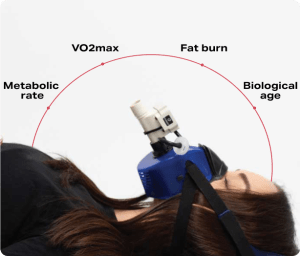PNOE Resting Metabolism Analysis and Assessment
PNOE (Personalized Nutrition and Optimal Exercise) is a state-of-the-art metabolic analysis system that provides comprehensive insights into an individual’s metabolism. The PNOE resting metabolism analysis and assessment is designed to measure and analyze your resting metabolic rate (RMR) and other critical metabolic markers to help optimize health, performance, and nutritional strategies. Here’s a detailed explanation of what it entails:
What is Resting Metabolic Rate (RMR)?
Resting Metabolic Rate (RMR) is the amount of energy (calories) your body needs to maintain basic physiological functions while at rest, such as breathing, circulation, and cell production. RMR accounts for the majority of your daily calorie expenditure.
What is PNOE Resting Metabolism Analysis?
The PNOE resting metabolism analysis involves using a PNOE device to measure your metabolic rate and other related metrics while you are at rest. This analysis provides a detailed picture of your metabolic health and efficiency.
How Does the PNOE Assessment Work?
- Preparation:
- You will need to fast for several hours (typically overnight) before the test to ensure accurate results.
- Avoid strenuous exercise, caffeine, and certain medications before the assessment.
- Measurement:
- During the test, you will sit or lie down comfortably and breathe through a mouthpiece connected to the PNOE device.
- The PNOE system measures the volume of oxygen you consume (VO2) and the volume of carbon dioxide you produce (VCO2).
- The test usually takes around 10-15 minutes.

- Analysis:
- The collected data is analyzed to calculate your RMR and other metabolic parameters.
- The analysis provides insights into your metabolic rate, substrate utilization (carbohydrates vs. fats), and overall metabolic efficiency.
Key Metrics and Insights
- Resting Metabolic Rate (RMR): Total calories burned at rest, indicating baseline energy requirements.
- Respiratory Exchange Ratio (RER): The ratio of carbon dioxide produced to oxygen consumed, indicating the predominant fuel source (carbohydrates vs. fats).
- Oxygen Uptake (VO2): The amount of oxygen consumed, reflecting metabolic activity.
- Carbon Dioxide Production (VCO2): The amount of carbon dioxide produced, helping to assess metabolic efficiency.
- Substrate Utilization: Information on how your body uses carbohydrates and fats for energy at rest.
Benefits of PNOE Resting Metabolism Analysis
- Personalized Nutrition Plans: Tailor your diet based on your unique metabolic needs and optimize macronutrient distribution.
- Weight Management: Accurately determine caloric needs for weight loss, maintenance, or gain.
- Metabolic Health: Identify metabolic inefficiencies or disorders and monitor improvements over time.
- Performance Optimization: Enhance athletic performance by understanding and optimizing energy expenditure and substrate utilization.
Practical Applications
- Health and Wellness: Assess and monitor metabolic health for overall well-being.
- Weight Loss Programs: Create effective, personalized weight loss strategies based on accurate RMR data.
- Sports and Fitness: Optimize training and nutrition plans for improved athletic performance.
- Clinical Settings: Assist in diagnosing and managing metabolic disorders and conditions.
The PNOE resting metabolism analysis and assessment provide valuable, individualized insights into your metabolic health, enabling you to make informed decisions about your diet, exercise, and overall lifestyle to achieve your health and performance goals.
PNOĒ Resting Metabolic Analysis
At PNOĒ, we measure your metabolic rate, heart, and lung fitness in a short period of time. Our advanced system collects and analyzes your data, producing a comprehensive report. Coach Debbie Potts then correlates this information with your Nutritional Therapy Assessment and intake forms to create a personalized nutrition plan. Note: Functional lab testing assessments are available for more specific data (ask Debbie for options).
Why Get a Resting Metabolic Test?
Your Resting Metabolic Rate (RMR) is your body’s baseline caloric requirement. Knowing your RMR enables you to:
- Craft Individualized Calorie Intake Targets: Tailor your diet to help you lose, gain, or maintain your weight.
- Verify Program Effectiveness: Assess if a training or nutrition program has increased or decreased your metabolism.
- Compare Metabolism: Understand how your metabolism compares to others of your gender, age, height, and weight.
Resting Metabolic Assessment Procedure
- Make an Appointment:
- Schedule your RMR appointment online here.
- You can cancel or reschedule up to 24 hours beforehand.
- Preparation:
- Refrain from strenuous exercise for at least 12 hours before the test.
- Avoid eating for at least 5 hours and using caffeine or nicotine for at least 6 hours before the test.
- During the Test:
- Lie down on our recliner for about 10 minutes.
- Breathe into a mask that collects and analyzes your exhaled air.
- Post-Test:
- Coach Debbie Potts will follow up with a detailed report and an action plan with specific recommendations.
Summary
A metabolic slowdown can be a significant obstacle to achieving your dream physique and maintaining long-term health. Monitoring your metabolism is crucial to prevent or address declines in metabolic rate. The PNOĒ metabolic analyzer provides a clinical-grade analysis of your metabolism, helping you act early to avoid the pitfalls of a metabolic slowdown.
Contact Information
Get your PNOĒ metabolism test and Nutritional Therapy Assessment today with Coach Debbie Potts. Visit debbiepotts.net for more information and to schedule your appointment.
Who is Coach Debbie Potts?
Debbie Potts has been a dedicated professional in the health and fitness industry for over twenty-five years and a competitive endurance athlete for twenty years. She has achieved numerous milestones, including being nominated as one of the top one hundred best trainers in the U.S. by Men’s Journal in 2004 and 2005. Debbie has participated in fifteen Ironman Triathlons, including five appearances at the Hawaii World Ironman Championship.
For twelve years, Debbie owned and operated a fitness studio in Bellevue, Washington, offering an “all-in-one” health and fitness experience. This included The WHOLESTIC Method coaching programs and individualized Nutritional Therapy services aimed at transforming the whole person from the inside out.
In the summer of 2020, Debbie moved from Bellevue to North San Diego to enhance her quality of life after battling “Adrenal Exhaustion,” chronic fatigue, and “metabolic chaos” since 2013. She authored the book “Life is Not a Race – It is a Journey” to share her experiences and help other ambitious high performers avoid the pitfalls she encountered despite doing all the “right” things.
Debbie’s educational background includes:
- BA in Exercise Science & Corporate Fitness
- ACSM Health Fitness
- Natural Running Coach with Newton
- NASM Certified Personal Trainer
- Metabolic Efficiency Specialist with Bob Seebohar
- USA Triathlon Certified Coach Level One
- Superhuman Coach & Kion Coach for Ben Greenfield
- CHEK Holistic Lifestyle Coach (HLC)
- Certified Functional Nutritional Therapy Practitioner (FNTP)
- Certified Functional Diagnostic Nutrition Practitioner (FDNP)
- Metabolic Expert Certification (PNOE) with Daniel Crumback
- Stacy Sims Menopause 2.0 Course 2023
- Designs for Health Supplement certification (currently)
- Wild Health Certification – Precision Medicine Fellowship 2024
- Board Certification in summer 2024
- Certified CPR & AED
Debbie has shared her expertise as the owner of Fitness Forward Studio, creator of The WHOLESTIC Method, and host of The Low Carb Athlete podcast. Her career highlights include competing in over fifteen Ironman Triathlons and numerous marathons, including the Boston Marathon with a personal record of 3:12.
Debbie is passionate about coaching high performers to reclaim their vibrant selves by investigating underlying health issues and putting the missing pieces of their unique health puzzles back together. She aims to help clients become fat burners, optimize health, and enhance performance in life and sports through The WHOLESTIC Method.
Debbie’s journey from a top age-group triathlete, marathoner, and cyclist to a coach recovering from burnout has fueled her mission to help others avoid similar experiences. She offers comprehensive programs like The WHOLESTIC Method’s 5-day and 30-day total transformation detox, repair, and rebuild plans to improve health at a cellular level.
Her book, “Life is Not a Race,” and her podcast, “The Low Carb Athlete,” emphasize pacing oneself and transforming the whole athlete from the inside out with her unique coaching approach.
LIFE IS NOT A RACE… It is a Journey! Pace the WHOLE You with The WHOLESTIC Method.




